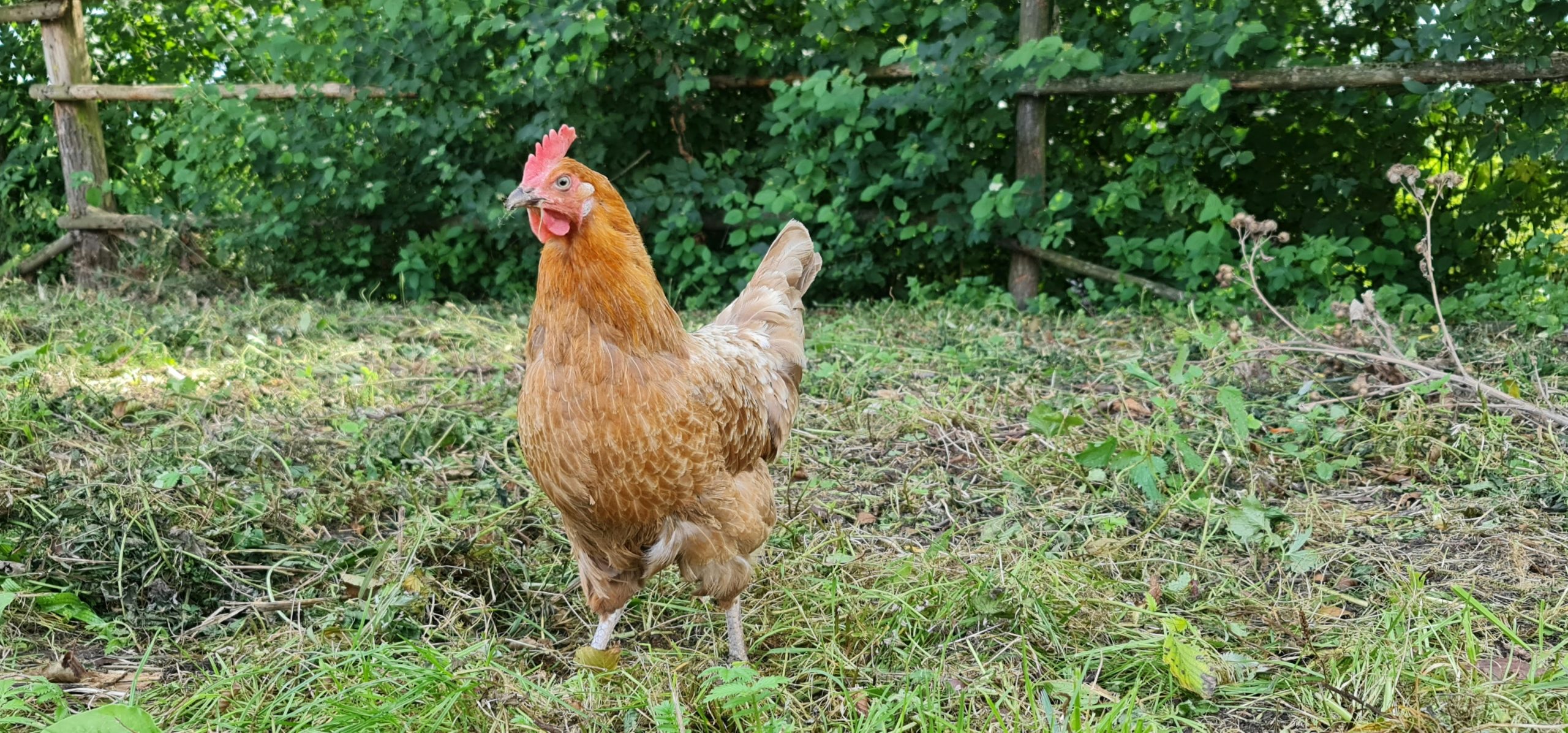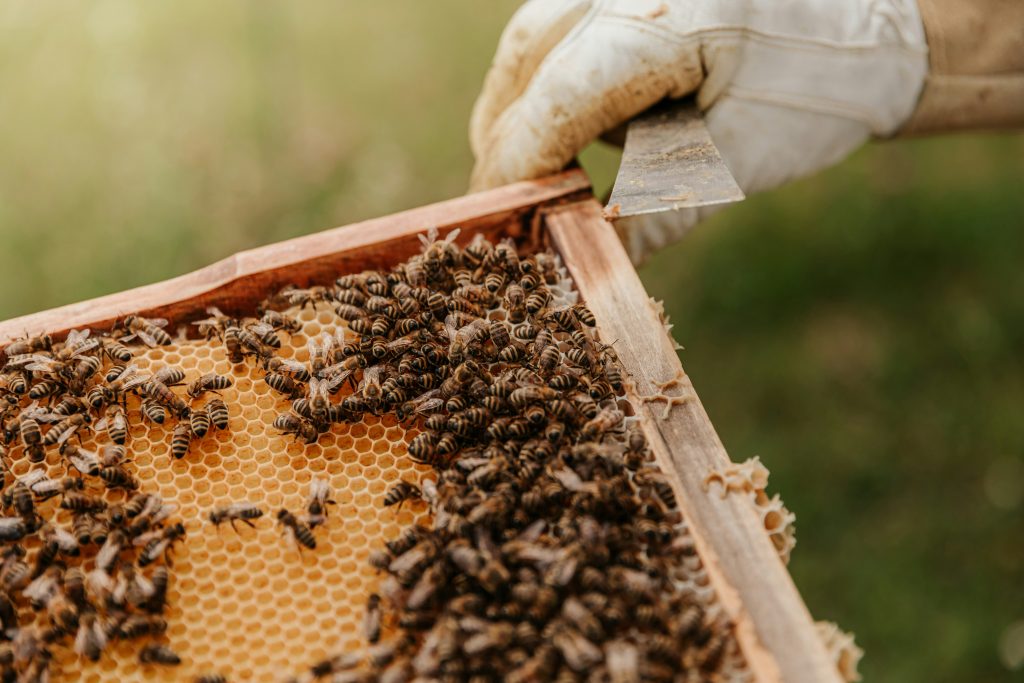
Free range hens, organic eggs, bio land
About
Ygea Eggs prides itself on offering organic, free-range eggs. Their family-run bio farm nestled in the fertile foothills of central Cyprus provides ample open space, sunshine, and fresh air for their hens. The farm also ensures the hens are fed an excellent, fully-certified organic diet. The commitment extends to supporting local farming, promoting organic foods, advocating for humane treatment of animals, and conserving nature. From their perspective, this approach fosters a healthier balance between nature and food production. They were able to start their business with an EU fund. They believe in a sustainable way to farm their name stands for land & healthy and that’s their core value.
Sustainable Development
Firstly, they pay a lot of attention to their land, they are using a concept called circular farming which is a form of permaculture. They do this to keep nature alive, through creating a way/structure in their land, a natural way of watering, and the trees will help each other out. This way the land needs minimal watering. Their main product us egg production. They produce around 4,500 eggs a day. They are constantly trying to find and explore new sustainable ways an example of this is through feeding the chickens season fruit (eg. in summertime where there is a lot of prickle pears on their land, they feed them to their chickens), they believe that this way not only are you using products that naturally grow in your land but you also keep your chickens healthier by diversifying their diet and using the different nutritional values of natural products. However, having a sustainable egg production business is not easy. If you are not sure that you can sell your eggs you can go bankrupt. You need to be certain of the market you are entering, also in regards to the EU fund they started with you only get the full funding if you are able to make it through the first five years, which are really challenging years.
Sustainability Impact
Sustainability is really important for the company. In order to succeed you need to take care of the land first. Meaning that you need to take care of the bee population in your land, to stimulate the natural growth of herbs and vegetation. This also brings more birds (such as owls) to the land which in turn help in controlling animals like rats and certain insects but also help in the growth of plants that are close to extinction.

SDGs goals and Sustainable development strategy
Goal 2. Zero Hunger: Promote sustainable agriculture through ethical beekeeping. Also honey never goes bad so they also educate people to understand that honey never goes bad even if it changes forms (eg. If it crystalizes it does not mean its bad, it is due to the weather – it is colder). Additionally, they hold workshops on collecting herbs. They believe that nature can offer more than we think, for example they teach which herbs can be found in your own back yard that are not only edible but also nutritious. Lastly, they also deal with a lot of kids that have nutritional difficulties but really like honey.
Goal 2. Zero Hunger: The first eggs that the chickens produce are usually too small to sell so we donate them to different foundations (eg. Rehab facilities, to economically disadvantaged families etc.)
Goal 3. Good Health and Well-Being: It is important to be aware of what we put in our body which is what we try to promote with our organic eggs.
Goal 6. Clean Water and Sanitation: This is really important especially for a place like Cyprus which struggles with water. A way that we do this is through using the concept of permaculture on our land.
Goal 11. Sustainable Cities and Communities: This is something we encourage by having free-range chickens and working on our land and the natural vegetations and also giving a home to make wild animals in the area. We need to try to encourage a natural way of life as much as possible.
Goal 12. Responsible Consumption and Production: We produce biological eggs using no pesticides, synthetic fertilizers or toxic chemicals, which are bad for our health and the environment. We also Avoid synthetic hormones (which are frequently given to conventional dairy and meat animals to alter reproductive cycles and speed up growth) means less stress for animals and reduced human exposure to endocrine-disrupting chemicals. Lastly our animal feed produced exclusively from vegetative (pure plant) raw materials, non genetically modified.
Strategy & Mission
The organization does not have a written strategy. Their mission and vision are definitely related to sustainability. Sustainability is part of their core belief system their vision is to turn the whole area of the farm into a green area, a natural forest. They believe in nutritional vs pharmaceutical lifestyle. They earth and land can provide us with a lot of benefits and we should try to get closer to that.
Innovative approaches &Challenges
Some of the innovative approaches to meet sustainable goals was to invest in creating their farm in line with permaculture which eventually will also limit their irrigation water use. They also believe in natural medicine and to getting closer to our ancestral practices closer to nature. In addition, they feed their chickens seasonal fruits and produce which is naturally grown in their land, believing that diversifying their diet keeps them healthier and happier.

Produce chickpea snacks as a healthy snack alternative
About
The original idea for our company came from my nutritional science degree. As a passionate food blogger with a strong interest in healthy eating, I asked myself how to make healthy eating fun and easy. At the same time, I heard a lot about pulses during my studies and realised that pulses are still totally underrepresented as a plant group in the classic products you find in the supermarket. That was about 7 years ago, a completely different time - hummus, for example, was only just emerging. At that time, we were one of the first to start turning pulses into snacks to make them more accessible as an extremely healthy plant group and at the same time offer a tasty, healthy snack. After founding the company in 2019, we initially focussed on achieving our proof of market by testing whether our product was accepted on the market at all. Within six months, we gained enough customers that our first production facility became too small and we had to relocate. Our production continued to grow and we constantly had to maintain a balance between sales and production, only acquiring as many customers as we could serve. At the same time, of course, we also wanted to grow and not turn anyone down - that was the biggest challenge in the first three years. We then moved back into our current production hall, which is built in such a way that it will be sufficient for us for a long time to come. Our focus is on customer acquisition, and this year we are also starting to expand our brand in order to be more present at trade fairs and events. Our employees are mainly involved in production and are gradually taking on more responsibility. Initially, the founders were responsible for logistics and all order processing, but this is now gradually being transferred to the team. The founders are thus becoming managing directors and concentrating on their core tasks.

Sustainable Development
It is not easy to answer this question as I do not have a clear definition of sustainability. My personal view is probably rather vague and broad. For me, everything is sustainable if my actions today have a positive impact on my future or are designed to be meaningful in the long term. I endeavor to ensure that what I do today not only works in the short term, but will still make sense in 10 years. This applies to various areas, starting with our products. My background as a nutritionist directs my focus towards the nutritional aspect, which I consider to be sustainable. Our products are healthy and they are just as great for the human body today as they will be in 10 years.
Sustainability Impact
I believe that from the very beginning, we have put a lot of our heart, passion and personal conviction into sustainability. We live these values not only in business, but also in our personal lives. Nevertheless, we know that there are still areas in which we can continue to improve. We then consciously consider these aspects and reflect on them. To summarise, I would say that there are many aspects of sustainability that we unconsciously integrate into our actions. For us at Hülsenreich, sustainability means that everything we do and the products we put on the market should not only be beneficial to people's health, but also have a positive impact on the environment and this in the long term.
SDGs goals and Sustainable development strategy
Goal 1. No Poverty: In my opinion, what sets us apart is that our production work is a catchment area for very diverse people. It's not just working students from privileged households who work for us, but a very mixed bunch, consisting of Ukrainian refugees, for example, or people who haven't had a job for a while. We are an open team. The production work also makes this possible, as the tasks can be learnt quickly, so we don't exclude anyone. On a global level, we have supplier screening, so we make sure that everything is sound. The chocolate we use is Fair Trade, but we don't yet manage to trace everything right through to the end of the supply chain, so we rely on the information provided by the suppliers. We are a certified organic company. It is not guaranteed that certified organic suppliers automatically take social aspects into account. Nevertheless, it is often the case that the organic sector not only emphasises quality, but also social interaction and fair conditions.
Goal 2. Zero Hunger: I think this is probably one of our subconscious core sustainability goals. This is particularly evident in the fact that we produce high-quality, nutritious food that is also sourced regionally. This is part of our DNA, so to speak. We are also actively committed to chickpea cultivation in Germany, with an eye to the future. In view of advancing climate change and other developments in agriculture, it is already foreseeable that conventional main raw materials such as wheat or maize will face challenges. Agriculture must diversify and start growing niche crops now. This is not only important for the security of food and raw material supplies, but also for soil conservation. We are actively engaged in dialogue with farmers and other processors and regularly take part in panel discussions and network meetings to explore opportunities. We have even carried out a test cultivation with a farmer in Saxony-Anhalt and are already sourcing German chickpeas, which we do not yet process but offer as raw goods in our online shop. This is an issue close to our hearts, as chickpeas and pulses in general can play an important role in the future of agriculture and soil conservation.
Goal 3. Good Health and Well-Being: Once a year, we undergo an inspection by an expert from the employers' liability insurance association (in german: Berufsgenossenschaft BGN). This expert inspects the production facility with regard to occupational safety and also checks whether the workstations meet the standards from an ergonomic point of view. This inspection is a voluntary measure. Through the BGN, we also organise an annual back workshop in which our employees learn how to improve their back health. In addition, we provide our employees with fresh juices, fruit and our healthy chickpea snacks free of charge and in unlimited quantities.
Goal 5. Gender Equality: As a small company, we are extremely flexible when it comes to adapting working conditions. It is clear that there are shifts in production, so production employees are bound to these. For all other tasks and positions, however, we offer the option of working from home. We have already supported an employee in production who became pregnant but wanted to continue working for us until her maternity leave. We successfully found alternative tasks for her, which she was able to carry out until shortly before the birth. After the birth, we adjusted her shifts so that she could take her child to and from daycare. Our small size allows us to react flexibly to situations like this. Gender is completely irrelevant when it comes to assigning tasks and salary.
Goal 8. Decent Work and Economic Growth: We have already discussed how we deal with our employees and suppliers elsewhere. I would like to emphasize one more thing that probably sets us apart from other start-ups: We are not planning to sell our start-up to the highest bidder within the next few years, but we want to build a company that will be around for the long term. Of course, this also influences how we operate.
Goal 13. Climate Action: By promoting pulses in general, with the aim of increasing the circulation and cultivation of pulses, we are making a contribution to climate protection. These efforts aim to ensure that pulses increasingly replace animal products, which has a positive impact on the climate.
Goal 17. Partnerships for the Goals: We are active in various networks, including a network of representatives from the niche market for pulses, which covers the entire value chain from growers to processors. Another network consists of sustainably-minded start-ups that focus on mutual support and cooperation. There are increasing opportunities for cooperation here, which we see as a goal for this year. A third aspect of our network relates to our main investor, who is himself active in food production and agriculture. This partner is extremely valuable to us, as we can learn from their experience and also utilise their agricultural produce. The result is a win-win situation that benefits both sides.
Strategy & Mission
We do not have a formulated sustainability strategy, but we are pursuing various sustainability goals on a subconscious level. Our sustainable behaviour tends to happen on an intuitive basis. As our company becomes more complex, we need to document, record and anchor processes more intensively. I also observe this in other areas, especially when tasks are delegated and structures become more complex. In such cases, it is time to record the processes in writing. This approach can also be applied to the topic of sustainability. At the moment, our small team operates intuitively and in a common direction. However, as the structures continue to grow, we will probably move towards putting our starting points, our core identity and our principles in writing. This will ensure that everyone in the company is on board and that the sustainable principles can be communicated clearly and consistently.
Innovative approaches &Challenges
Employee satisfaction and safety are very important to us. Our production hall is currently not heated, which is beneficial for our electricity and energy consumption, but poses a challenge for our employees. We currently use infrared radiators and heated shoe soles to create a pleasant working environment. In the long term, however, it is necessary to find a solution that both increases the comfort of our employees and is energy-efficient. Heating a large production hall is not an ideal option for us as a manufacturing company for cost and energy reasons. We are therefore endeavouring to find an innovative and sustainable solution to improve our employees' working environment in the long term.

Promotes products the beekeepers produce & organizes recreational educational activities about bees, rural products and the natural environment
About
The business was founded at the end of 2014, as an agrotourism company. The initial idea was to show tourists a unique experience in nature, through showcasing beekeeping, herb collecting and explaining the properties of the local herbs. They would arrange luxury services – for example, having brunch in a remote area with fresh and local products. Around 2018 they realized that schools were also interested. Schools reached out to them to have visits with the kids. The experience was really good, the kids loved it. Due to her experience as a biologist educating is something she is really passionate about so she decided to focus more on schools. Tourism and tourist agents were no longer their focus. That was a turning point for the company as they focused on having a better space, better premises to facilitate school visits. Their focus turned from luxury services to then focusing on education. This in turn had an environment turn – they now also had to think of their use of paper, paper cups etc. But nowadays the tourist sector is also interested in alternative agricultural services. Tourist agents are also interested in having Ecophysis be a part of their tours of Cyprus.

Sustainable Development
The core value of Ecophysis was doing something that is sustainable they wanted the Pure Hospitality of Cyprus to be shown. After 2018 they realized that they are more interested in Educations and young people vs tourists. Back then the tourist sector was not ready for sustainable agriculture. All their products and services promote a lifestyle near nature, preserving nature and on how we can handle herbs we pick up and bees. This all showcase the sustainability they want to promote. An important moment for the company was when they decided to go plastic free. They replaced the plastic bottles that they used for over 20 years with glass jars. Now they only have glass jars and all the systems that allows this transition (eg. washing machine for glass), their labels are also new to allow for the shape of the jars, be according to the law and have an attractive design for their clients. This process is more expensive, and it also adds to the working hours as it needs more attention and space to save them. But this was a decision they felt they wanted to make, and it also improves the quality of their products.
Sustainability Impact
Sustainability development definitely impacts the company in a positive way, guests are excited to explore sustainable places like our organization. Also the quality of our products with the glass jars is better and out labels are more attractive. However, with the change of jars to glass ones they also lost some clients who wanted plastic jars who felt glass jars was not convenient for them. The founders of the organization Georgia and Kostas are responsible for the implementation of sustainable development. Georgia (founder) explained that Kostas (co-founder) has the values and passions for sustainability while Georgia has the scientific background and is able to translate those values into practice.
SDGs goals and Sustainable development strategy
Goal 2. Zero Hunger: Promote sustainable agriculture through ethical beekeeping. Also honey never goes bad so they also educate people to understand that honey never goes bad even if it changes forms (eg. If it crystalizes it does not mean its bad, it is due to the weather – it is colder). Additionally, they hold workshops on collecting herbs. They believe that nature can offer more than we think, for example they teach which herbs can be found in your own back yard that are not only edible but also nutritious. Lastly, they also deal with a lot of kids that have nutritional difficulties but really like honey.
Goal 3. Good Health and Well-Being: Honey has anti-bacterial properties which is beneficial for the body. Through this they promote natural nutrition for your body as well as your skin with workshops on how to make your own balms which are great for the skin. Their educational workshops promote good health and well being through the connection of nature.
Goal 4. Quality Education: They are very focused on giving quality educational workshops. They do not charge a lot for the educational workshops such as: beekeepers for a day and how to make balms and ointments.
Goal 5. Gender Equality: The company follows a woman led structure, Georgia is a woman and the boss (Kostas embraced this and never had an issue with it). Through their company they promote female bee keepers as well as encourage girls to try it out in their workshops. In Cyprus there are only 3 or 4 women beekeepers and one of them is Georgia. Through these workshops they promote equal gender roles in children.
Goal 8. Decent Work and Economic Growth: Ecophysis is also promoting to young people that you can create a successful business in a village. When they were starting their business they felt strongly about wanting to develop something from a village, they did not want to go to the city. Vavla the village they ae based in only has 30 inhabitants. In this way they are helping the economic growth of the village by bringing people in through their workshops. In addition they are looking to expand their team and want to find employees from the nearby villages, helping people that want to stay in the village find jobs.
Goal 15. Life on Land: They are actively promoting the need to keep our natural vegetation in order for bees to be able to produce and thrive through their workshops. They encourage people to stop removing natural vegetation. It is important to understand that even in our own yards you can leave flowers for bees. It is important to stop ‘tidying up’ our gardens. They are actively trying to connect people with nature (eg. Stop using pesticides).
Strategy & Mission
When they started, they had a written strategy which was focused on tourism. Which is still relevant as every Sunday they have events that people can openly visit. However, this is something that in the future they will only be able to maintain if they have more employees. Before she started the business Georgia was working as a scientific officer for environmental organizations, so she had a lot of experience in researching and promoting SDGs strategies both in Cyprus and the EU, going to parliament etc. She was aware of all these efforts to protect the environment and be sustainable. This helped in having a strategy about sustainability without being conscious about it.
Innovative approaches &Challenges
The main challenge was profitability, some of the sustainable practices they have cost a lot more. Some of the new adaptations they want to include in their practices are also very expensive so it is not something they can do right now. For example to clean the water, to be able to re-use it but that is an expensive system that they need to look more into. Because they are in agricultural land they get water from the community but this is not sustainable it would be more so to be able to recycle water and use it for irrigation; thus not consuming drinking water for irrigation.

In September 2015, all 193 Member States of the United Nations adopted a plan for achieving a better future for all — laying out a path over the next 15 years to end extreme poverty, fight inequality and injustice, and protect our planet. At the heart of “Agenda 2030” are the 17 Sustainable Development Goals (SDGs) which clearly define the world we want — applying to all nations and leaving no one behind.
The new Global Goals result from a process that has been more inclusive than ever, with Governments involving business, civil society and citizens from the outset. We are all in agreement on where the world needs to go. Fulfilling these ambitions will take an unprecedented effort by all sectors in society — and business has to play a very important role in the process.
MORE ABOUT SUSTAINABLE DEVELOPMENT:
https://unglobalcompact.org/what-is-gc/our-work/sustainable-development
For full reference please visit website:
https://unglobalcompact.org/sdgs/about

No matter how large or small, and regardless of their industry, all companies can contribute to the SDGs. While the scale and scope of the global goals is unprecedented, the fundamental ways that business can contribute remain unchanged. The UN Global Compact asks companies to first do business responsibly and then pursue opportunities to solve societal challenges through business innovation and collaboration.
Global challenges – ranging from climate, water and food crises, to poverty, conflict and inequality – are in need of solutions that the private sector can deliver, representing a large and growing market for business innovation. In the rush to transform business models and systems for the future, integrity and values will have a huge role to play. For companies wanting to advance the SDG agenda, the job starts by acting responsibly – incorporating the Ten Principles of the UN Global Compact widely into strategies and operations, and understanding that good practices or innovation in one area cannot make up for doing harm in another.
See what you can do:
https://unglobalcompact.org/take-action/action
For full reference please visit website:
https://unglobalcompact.org/sdgs/about

1. Understand the SDGs and link relevant targets to your business activities
The very first step for companies in their SDG journey is to learn more about each of the goals, the relevant targets, and KPIs to see how they are directly and indirectly related to their business activities.
For example, Schneider Electric connected its business activities to all 17 goals via 5 megatrends: Climate, Circular Economy, Ethics, Health & Equity, and Development.
2. Define priorities
Companies should prioritize SDG targets by considering which will have the biggest impact in terms of risk or opportunity in medium- to long-term and which goals the company has the ability to contribute to achieving progress in. It may be that a company is contributing to all of the 17 goals, but when allocating resources and defining the timeline, it is important to start with those targets which create the largest impact. As an example, the Chinese technology company, Huawei, actively worked on developing the ICT Sustainable Development Goals Benchmark. They explored the relationship between ICT and sustainable development and identified the goals with the biggest correlation to the ICT sectors: SDG-4 – Quality of Education, SDG 3 – Good Health & Well-being, SDG 9 – Industry, Innovation and Infrastructure. These sectoral benchmarks can be used as the first step for the company to understand their impacts across different goals.
3. Set the goals.
Once the key SDGs are identified, it is important to link those goals to actual business targets and KPIs to monitor and communicate progress. Quite often, companies may already have existing targets and actions which they can leverage while developing their SDG strategy. Many science-based target (SBT) committed companies use their validated targets to monitor performance on the SDG 13 – Climate Action and SDG 7 – Affordable and Clean Energy. For example, Unilever provided a clear link and details on how their carbon positive targets align with various initiatives such as RE100, SBT, and contribute to the relevant SDGs.
4. Integrate.
In order to make the SDG strategy viable and effective, companies must integrate these targets into the existing strategy, taking into account business models, procurement and R&D processes, and supply chain transformations. By realigning sustainability strategies to achieve both corporate goals and the SDGs, companies can identify areas where they can draw from existing commitments and projects to contribute positively toward SDGs. Novo Nordisk partnered with Washington and Lee University to analyze how some of their existing programs are impacting SDGs and created an interactive chart showing those connections.
5. Innovate and collaborate
The SDGs provide a framework for innovation, creating business growth opportunities and new business models, products, or services that drive progress toward the goals. Following the framework also helps to identify partners within sectors and across different industries which enable organizations to scale up their efforts and ultimately achieve the goals. As part of their work on SBTs and SDG13 – Climate Action, Nokia identified that Radio Access Networks result in a global energy bill of over $70 billion. To address the need to decouple data growth from energy use, the company developed an innovative AirScale radio base station solution (BTS) for mobile operators, which consumes 28% less power and helps to build zero-emissions networks.
6. Report and communicate
Companies need to be ready to communicate their progress in addressing goals linked to the SDGs. It is crucial to integrate the SDGs in the core business reporting process to avoid duplicated efforts and ensure transparency and accessibility of their performance to various internal and external stakeholders.
Useful tools and methodologies are emerging for companies to understand better how they can contribute to the SDGs in a holistic way.
As an example, in August 2019, three accounting associations (Association of Chartered Certified Accountants (ACCA), Chartered Accountants Australia and New Zealand (CA ANZ) and Institute of Chartered Accountants of Scotland (ICAS)) jointly published SDG disclosure recommendations linking various reporting frameworks including the Global Reporting Initiative (GRI), the International Integrated Reporting Council (IIRC), the Taskforce on Climate related Financial Disclosures (TCFD) and the UK Financial Reporting Council (FRC) aimed at supporting organizations with their reports on progress towards the achievement of the SDGs.
For detailed strategies and examples, you can read the full article here:
https://www.gresb.com/nl-en/6-ways-business-can-align-with-sdgs-and-make-an-impact/

In February 2023, the Fairpreneurs project team gathered for their inaugural Transnational Project Meeting in Szczecin, hosted by the University. Delegates from Denmark, Ireland, and Cyprus joined forces to advance the project, focusing on the development of methodologies for the WP2 Good Practice Compendium and Curriculum Kit. The discussions explored identifying and engaging suitable businesses as case studies, establishing criteria, and formulating key interview questions. Additional talks delved into curriculum content, from modules and learning objectives to activities. The productive meeting concluded with a cultural stroll and a partner dinner in the city, cementing collaboration and setting the stage for future project milestones.